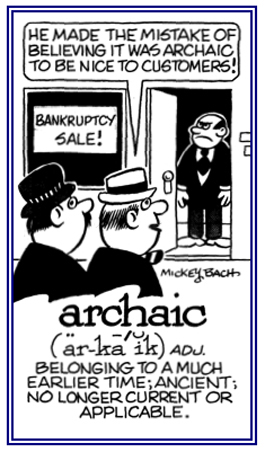2. In a linguistic form, commonly used in an earlier time but rare in present-day usage except to suggest the older time, as in religious rituals or historical novels: Examples of archaic language usages include the following: "thou", "wast", "methinks", and "forsooth".
3. Depicting the earliest stage; prior to full development: There was an archaic period of psychoanalytic research.
The company had to update its archaic computers because they were incapable of handling all of the data that was being installed into them.
4. A reference to or designating the style of the fine arts: There are some archaic paintings and sculptures that were developed in Greece from the middle of the 7th to the early 5th century B.C., primarily characterized by an increased emphasis on the human figure in action with naturalistic proportions and anatomical structures. There are also simplicity of volumes, forms, or designs, and the evolution of a definitive style for the narrative treatment of subject matters.5. A term used to describe an early stage in the development of civilization: In New World chronology, an archaic period existed just before the shift from hunting, gathering, and fishing to agricultural cultivation, pottery development, and village settlement.
Between 8000-1000 B.C., there were a series of archaic achievements which characterized certain periods: Early archaic 8000-5000 B.C., mixture of big-game hunting tradition with early archaic cultures; also marked by post-glacial climatic change in association with the disappearance of Late Pleistocene big game animals. The middle archaic cultures were from 5000-2000 B.C., and a late archaic period from 2000-1000 B.C.

Go to this Word A Day Revisited Index
so you can see more of Mickey Bach's cartoons.
2. The representation of someone or something as existing or happening in a completely different period of time than it should: The novel has one anachronism after the other.
It is an obsolete notion to wear a bustle which has become obsolescent for daily wear. It is somewhat of an anachronism, like wearing lace mitts to the opera because lace mitts are archaic, something my great grandmother wore; however, now they are just considered an archaism best left for the manikin in the museum.
The archaic maiolica were sold as far away as Spain, North Africa, and northern Europe. There seems to be a connection to earlier Byzantine and Persian products.
